 |
November 17, 2025, 12:39 pm |
 |
|
 |
|
 |
Advertisments
 |
 |

Pamper Yourself
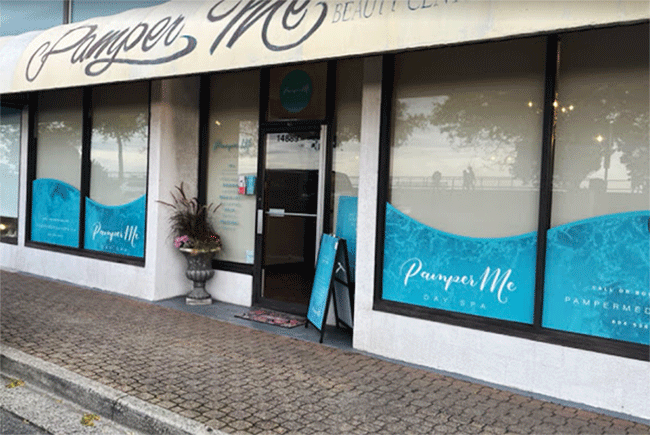
LOUISE SPARROW can lay claim to the title of the longest running business in White Rock.
This is the story of PAMPER ME
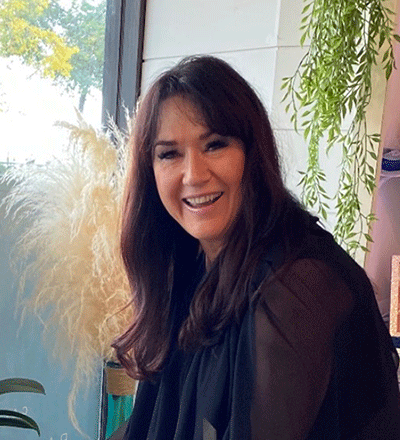
Louise how long have you owned and operated PAMPER ME on White Rock’s waterfront?
I have been running Pamper Me for 42 years. I grew up here in White Rock when I decided I wanted to have my own business it was an easy choice to set up shop on the waterfront of my hometown.
What are some of the features/services of PAMPER ME?

One of our most popular treatments that is new here are Pamper me is our IPL Adena face tightening and hair removal brown spots and vein treatment. It’s the most non-invasive way of changing your skin and making a difference with all these different modalities
We are the only waterfront spa in the lower mainland
We offer head to toe pampering services at the spa from our hair specialist all the way to laser treatments.
signature and eminence facials
slimming sessions
Moby lift face
tightening
IPL face tightening
hair removal laser treatments
One would normally assume PAMPER ME appeals mainly to women, but I understand you also appeal to us men?
Tell me about your couples sessions.

The atmosphere has always welcomed men along with women to enjoy all our services individually or as a couple. The couples sessions are very popular.
Pamper me has a number of special promotional events throughout the year.

There has been many fundraising and events here at the spa. Every Christmas and anniversary, which is May 4 was always celebrated with clients and friends and family. The other events have been here to promote new products and services as the spa always coming up with new innovative treatments
What are some of the major changes you have witnessed in White Rock over the years you have owned PAMPER ME?
I have watched the beach evolve and change from the eighties to 90s all the way up today. I was here before pay parking and in the early days there was not a promenade along the waterfront.
In closing Louise a few personal questions.
White Rock is home to a wide variety of dining establishments.
Do you have a favourite restaurant for your nights out?
My favourite restaurant has always been my neighbours at Cosmos, they’ve watched me grow since the beginning
Favourite store you shop at?
My other neighbour Me & Gee boutique would be my go to for that perfect outfit
Anywhere you can go to recharge your batteries, a place you can visit to remind you how special White Rock and area is?
Just being on the beach with my feet in the sand is a complete recharge
Thank you Louise for showing us around PAMPER ME.
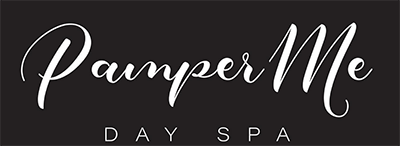
Book yourself a spa treatment today, or stop by and pick up a gift certificate for that special person for a special occasion.
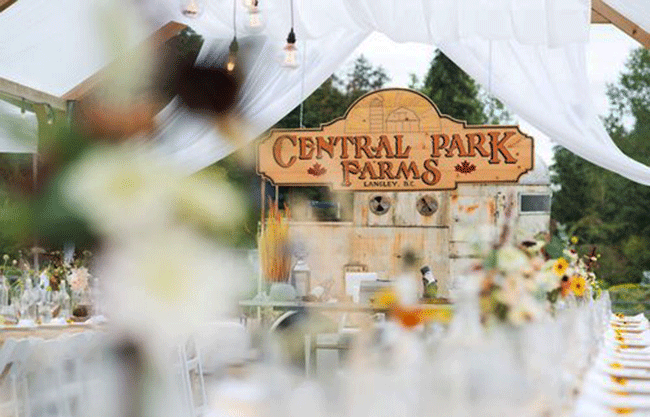
Our mission here at Central Park Farms is to not only play a part in feeding our community, but to help connect you to exactly where your food is coming from and how it was produced.
Let’s take this journey together and get back to a true understanding of local agriculture!
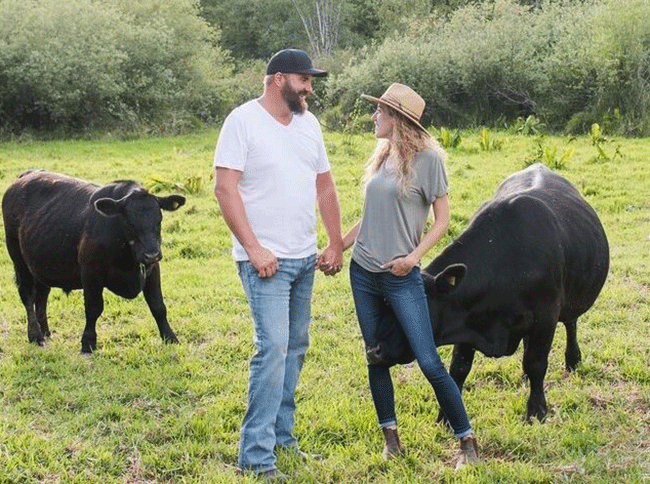
Kendall’s story
After falling for my 5th-generation farm-boy Jay, I set out to learn everything about his previous life as the owner and operator of a large-scale quail farm. The more I learned about the industry, the more I realized the labels I trusted on the meat at the grocery store didn't mean what I thought they did. And, I finally knew it first hand.
Determined to know exactly where the food was coming from that I was feeding our family, I set out to start raising it myself. The only problem? Jay, having retired from farming years before we met, swore he’d moved on from that part of his life.
Now don’t worry, you’ll soon learn I’m not one to take ‘no’ for an answer! I finally convinced Jay to, at the very least, teach me how to raise a few chickens for our family.
Under the agreement that I would at least raise enough to sell to friends and family to offset my costs, Jay dug out some of his old farm equipment while I was at work and surprised me with 500 chicks when I got home that day.
I’m pretty sure he figured it was best to go big with 500 birds so I’d only do it the once, even if that meant we’d be eating the same old batch of chicken for the next 10 years.
Well the joke was on him, over 200 chickens flew the coop on the first day back from the processors and just like that, back in 2015, Central Park Farms was born…
And we’ve been running to catch up since
Jay’s version
After my family got out of farming I certainly didn’t expect to get back in, especially the way we farm today but here we are eight years after Kendall first talked me into that first round of chickens.
There’s no way I would have thought Kendall would want to make agriculture her life’s work when we first met. She was a corporate business woman with almost no understanding of farming.
And while she didn’t know the first thing about farming, I didn’t know the first thing about social media and tech is not my area so we’ve taught each other a lot along the way as Kendall began sharing our farm’s story online.
Now as far as those first chickens are concerned, that’s right I didn’t think there was a chance that she would ever want to go from the one batch of birds to a full time farmer.
Regardless of how we got back into it, I’m glad to get to work with my family and connect with our customers.
Our mission here at Central Park Farms is to not only play a part in feeding our community, but to help connect you to exactly where your food is coming from and how it was produced.
Let’s take this journey together and get back to a true understanding of local agriculture!
How do I buy from Central Park Farms?
We currently offer weekly home delivery as well as pick up from our farm shop.
Our farm shop is located at 225 216th Street in Langley and is open Tuesday: 9am — 1pm, Thursday: 12pm — 4pm, and Saturday 10am — 2pm.
Do I need to preorder if I’m coming to the farm shop?
Not at all! We have multiple glass front freezers full of products and you can just show up during our open hours and shop for whatever products we have. Whatever is available online will be available in the store plus we sometimes have some farm store exclusive items that don’t travel well for home delivery.
If you prefer to just pop in and grab an order that’s already packed and ready to go, then we suggest placing an online order for pick up.
Where do you deliver to?
Tuesday: Chilliwack, Abbotsford, Aldergrove, Langley, White Rock, Surrey, Delta
Wednesday: Ladner, Richmond, Vancouver, North Vancouver, West Vancouver
Thursday: Burnaby, New Westminster, Coquitlam, Port Coquitlam, Maple Ridge, Pitt Meadows
Is there a minimum order?
There’s a minimum order of $150 for home delivery. There is no minimum for farm pick up or shopping at the farm store.
Is there a charge for delivery?
There’s a minimum order of $150 for home delivery and the fee is $11.95. For orders over $300, use promo code FREEDELIVERY to get free delivery.
Do I need to be home to receive my delivery?
No, all our products are shipped frozen and if you’re not home at time of delivery it’s packed in an insulated box. This will extend the time it can be kept on your doorstep, but you’ll want to have someone receive it in a timely fashion.
To cut down on unnecessary packaging many customers leave a cooler out for us if they don't plan to be home.
You’ll receive a text message prior to delivery and then again once it’s on your doorstep.
I live in an apartment, can you deliver to me?
Yes, as long as you'll be home the day of delivery to meet us in the lobby or if there’s an option to leave it with a receptionist in your building.
When is the order deadline?
We need 48 hours from the time of order for delivery or pick up. That said, we often have them ready sooner so reach out if you need an order sooner. Please keep in mind that we’re a family run farm and do all the jobs from caring for animals to packing orders and delivering them, so we may not be able to make exceptions to the 48 hour deadline depending on the week.
From our family to yours…
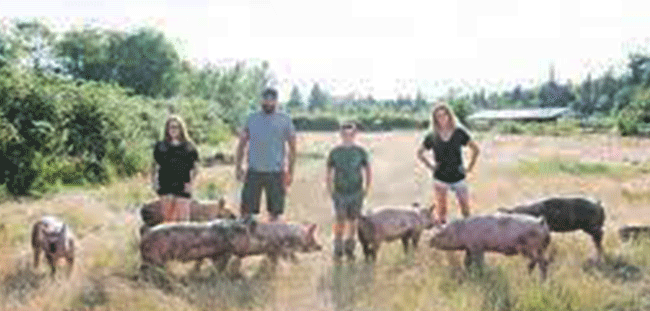
“A family run farm you feel like you are part of. We have been buying from the farm for several years now and have grown attached to them like they were part of our family.
At home we call them kindly "our farmers" and everyone knows who we are talking about.”
Farm Store
225 216th Street, Langley
Tuesday: 9am — 1pm
Thursday: 12pm — 4pm
Saturday: 10am — 2pm
Cider House Rules
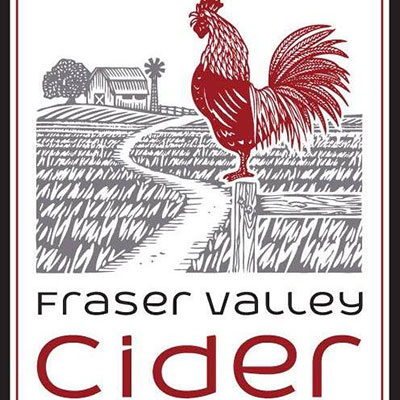
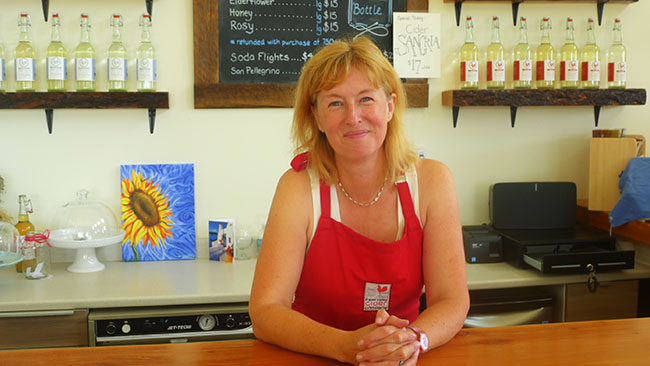
Rachel Bolongaro
Today we are talking with RACEHL BOLONGARO the co-owner of the Fraser Valley’s firs full production cidery. Welcome RACHEL. Your accent (British) belies you are not originally from these parts. How did your travels bring you to the Langley area?
We came over from Britain in 1998. Faced with a move to London that we really weren’t looking forward to, we opened a copy of Yachting World one day, saw a picture of Desolation Sound and said “lets go there instead!”. Three months later our landed immigrant cards had arrived, we’d sold our house, the dog got put in a travel crate and we were on a flight to Vancouver. We’ve never looked back since arriving in Canada but ironically we still haven’t made it to Desolation Sound!
When did you actually open the Fraser Valley Cider Company?
We opened May 23rd 2016 but we have been working on our project since mid 2013 and bought the farm in March 2014.
I seem to remember reading recently cider is rapidly increasing in popularity. Can you provide any insight or confirmation into this phenomenon?
Yes - many different sources point to cider being the fastest growing beverage sector in north america and craft cider is a big part of that. There is a huge craft cider scene in Portland and Seattle and it seems to be tracking up the West Coast - similar to the surge in craft beer 5 years ago.
Now for something completely different. How did you go from a career in engineering to a rural farm in South Langley brewing and bottling your cider creations?
I’d been an engineer for 20 years and although I enjoyed the hands on aspect of it, I was being increasingly channeled into more administrative tasks as my career progressed. Plus I felt that sitting at a desk all day was slowly killing me! I looked forward to the next 20 years and couldn’t see myself doing more of the same. Instead I made a list of what I enjoyed, batch production (in my past as a chemical engineer I made pharmaceuticals!), growing things in my garden, creating things and home winemaking and brewing. I visited some cideries on Vancouver Island, really enjoyed the experience and saw a gap on the Mainland for a similar “back to the orchard experience”. Thus a project was born!
You have explained to me you took a course in cider production in Seattle. Tell our readers about that experience.
It was an amazing week long experience with 20 other cider makers - both novice and professional. The course was taught by an instructor from the UK who is himself an award winning cider maker. We started each day with cider appreciation. By 10am the atmosphere in the room was very convivial! We did a course of lectures that covered all aspects of the cider making process, talked about business and marketing, how to set up a production facility and everything we would need to know. This was supplemented by laboratory work and practical cider making - we all came home with a jug of cider - and workshops on orchard management. It was the most fun I’ve ever had on an educational course (some of the engineering ones can be a bit dry!)
How many different ciders do you create and where did you get your recipes from?
We currently have five different ciders. Bone Dry, House Cider, Rosy, Elderflower and Honey. My recipes come from several years of experimentation with apple types and yeasts. I try them out on family and friends and have had many fun “focus groups!”. We were told on our course to make cider that your customers like, not necessarily what you like (although you have to be proud of the product). I got a lot of feedback from friends I can trust to give me the straight goods! I think that was key in developing our range of ciders which have been very well received by the customers. We focus more on dry ciders since that seems to be a gap in the market right now with the commercial varieties. However we hope there is something for everyone within our range of ciders.
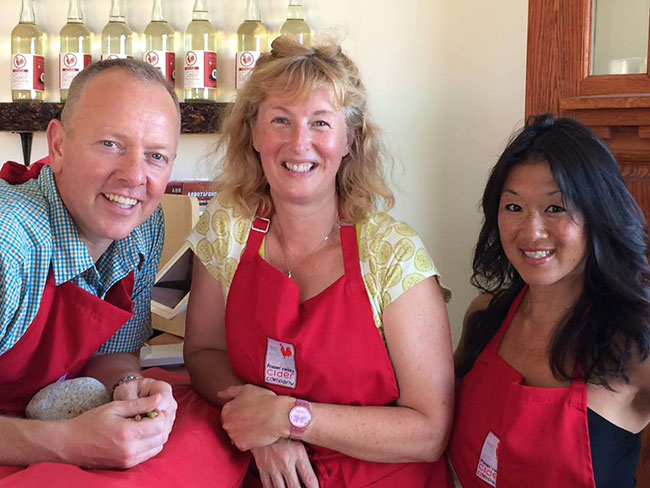
Sean & Rachel Bologaro & staffer Miki Dawson
With a twinkle in your eye you say you are living out your mid-life crisis ha ha. Was there another option when you decided “something” had to change in your life?
My husband Sean has always been very supportive and has encouraged me in all my (sometimes crazy) decisions. One thing I did think about was going to art school. A keen artist in my youth, my parents were reluctant to support the art school option when university came around. Don’t tell them but I think they made the right decision!
You are located in the heart of Langley wine country. Was this by chance of did you actively seek out your current location?
We did see this as an asset when we purchased our farm however we totally under-estimated how helpful this would be in getting our business off the ground. Our winery neighbours, Township 7, Domaine de Chaberton, Backyard and Vista D’oro have been so welcoming and supportive. They share their knowledge and resources with us and are always sending customers to their wineries our way as well. Their staff often drop by for after works drinks too (we open later than they do). This was something I didn’t anticipate - we now have a great circle of new friends!
Do you produce your cider from your own orchard?
We have 4 acres of heritage english and french cider apples planted - 27 different varieties. These trees will start to bear next year and then we’ll be introducing a more traditional english style cider into our line-up. Right now we lease land in the Okanagan and our partner farm sends us some apples to tide us over.
Is it safe to say growing up in England cider was more commonplace than it was/is in North America?
Yes - cider is a huge part of English culture. Its as much about tradition and heritage as it is about a drink. We really missed that and the whole english pub scene when we came to Canada. Cider has been produced in the UK since the Norman conquest of 1066. In the 1700’s it was common as a farm worker to receive part of your wages in cider. The farms that made good cider got their pick of the labourers. When this was abolished in the early 1800’s and farmers were forced to pay in money instead there was a riot. Not by the farmers though but by the workers!
Two things that instantly set you apart from other liquor vendors?
1. Your logo has a rooster.
Yes Rocky the rooster! He has nothing to do with cider but we find him very appealing. We have been long time chicken keepers so I suppose there is a connection there. One reason for including him and the farm scene on our logo is we wanted to emphasize our link to the countryside and the fact that we are an active farm, not just a production facility.
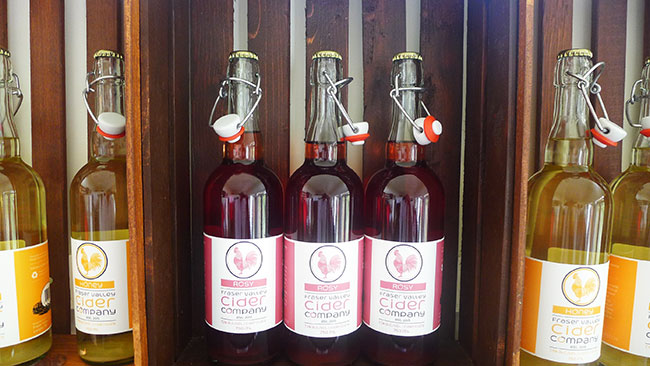
Your cider is bottled in a very unique vessel.
Yes our bottles come all the way from Germany. They need to be a special design to withstand the high pressures generated in our pasteurization process. They also look just great on our shelves and the customers seem to like them too. I know quite a few have been repurposed to hold olive oil, dish soap and kambucha!
Are the bottles recyclable?
Yes we take them back at the cidery and clean them for re-use. Its nice to be able to reduce that carbon footprint a little. Of course you can recycle them through the usual channels as well.
I noticed in the back of your warehouse you have quite the water treatment area. How and why did you have to add a private water treatment plant?
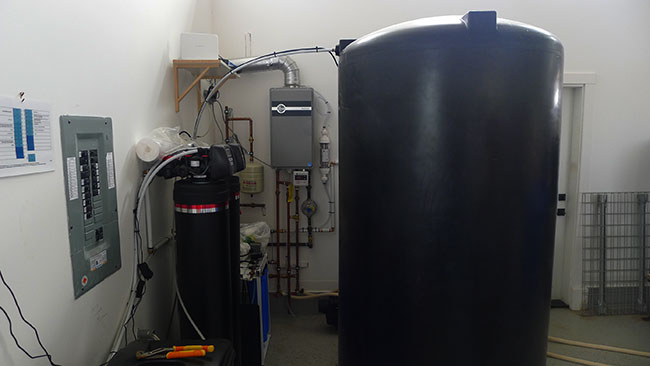
We had water quality issues with our well water (higher than mandated arsenic levels due to natural groundwater conditions). We always knew that we would have to treat the water but in discussions with our health authority the scale of the treatment system ended up being greater than we at first envisage. The treatment system produces top quality reverse osmosis water now.
Anyone that has started up a business knows that costs can run away from the original budget. What was/is your secret to keeping the costs of setting up Fraser Valley Cider?
It was important to get a really good cost estimate put together and include a healthy contingency. Even knowing our final budget we made sure we still had some excess borrowing capacity in case of the unexpected. Only having 90% of the money guarantees 100% failure of the project. We tracked costs carefully and made savings where we could. We put a lot of sweat equity into the project and made most of our own equipment to keep costs down. Towards the end of the project we cut out some of those “nice to have” items to keep within our budget. Anything we did include in the project though we made sure was 100% what we wanted it to be - build your last cidery first! Our engineering background came in really handy when it came to project managing the whole job.
You are holding a very special event coming up at the cider on Saturday August 20th. What do you have planned?
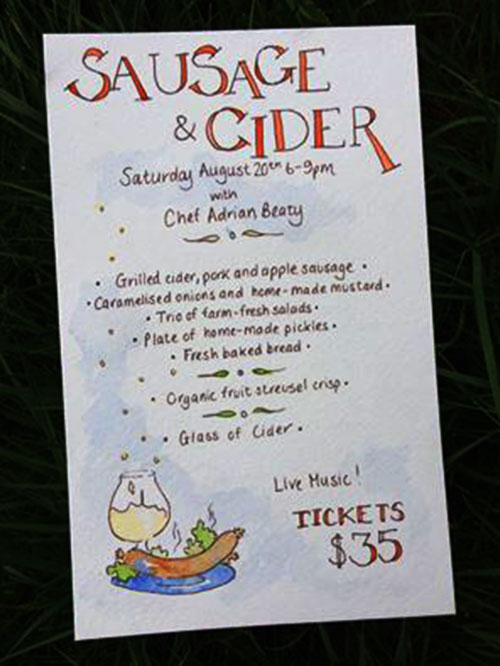
Yes its our first big event at the cidery! We have local chef Adrian Beaty coming out and he is creating us a special cider and apple sausage! We’re using pasture raised pork and other produce from our friends at Laurica Farm (the best sausage and bacon on the planet!). Chef Adrian has got a delicious menu planned out which he’ll be cooking completely on the barbecue. We have live music from James Devon - spanish and brazilian style guitar playing, we’ll get the fire pit going and of course they’ll be lots of cider! Tickets are limited to 60 and we’re selling them at the cidery and on-line at Eventbrite at a cost of $35. They’re selling fast and we’re looking forward to a really fun evening.
If anyone is interested in trying your cider and can’t make it out to the cidery where else is your cider currently available?
We sell at White Rock and Langley Farmers market and have just started selling at Broadway International Wine Shop in Kitsilano. Our cider is also served at the Orchard and The Sea cider bar in Gastown. I don’t think we’ll be selling too much more off-site this year. We have trouble keeping our own shelves stocked but we have plans to expand production next year.
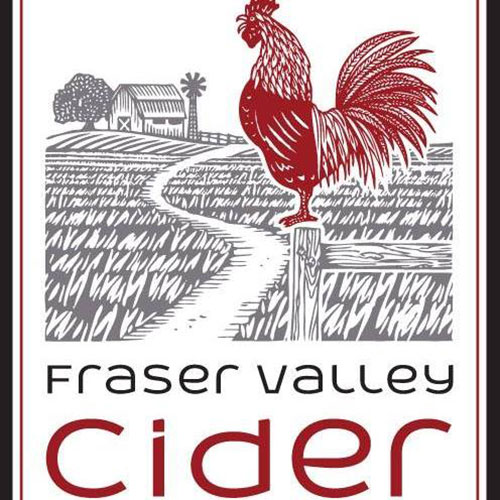

Visit The Fraser Valley Cider Company every Sunday at the White Rock Farmer's Market 10 a.m. - 2 p.m
|
|
|




























